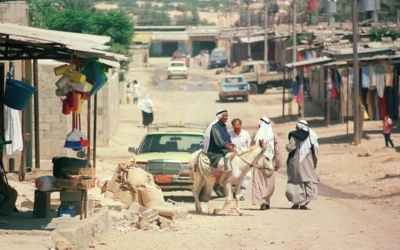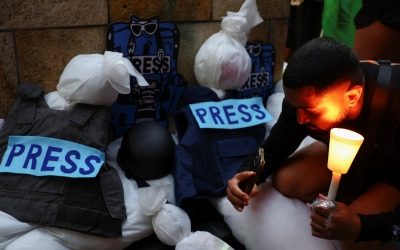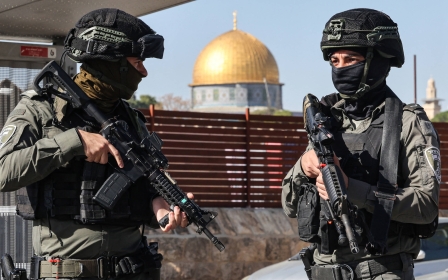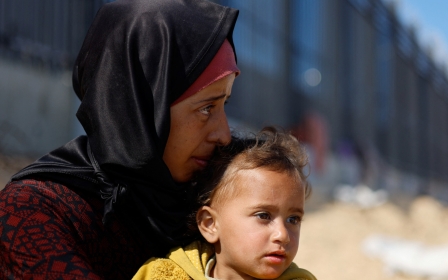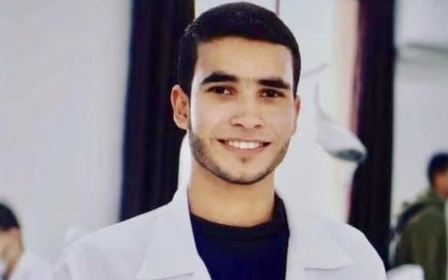War on Gaza: Nasser Hospital 'completely' knocked out of service by ongoing raid
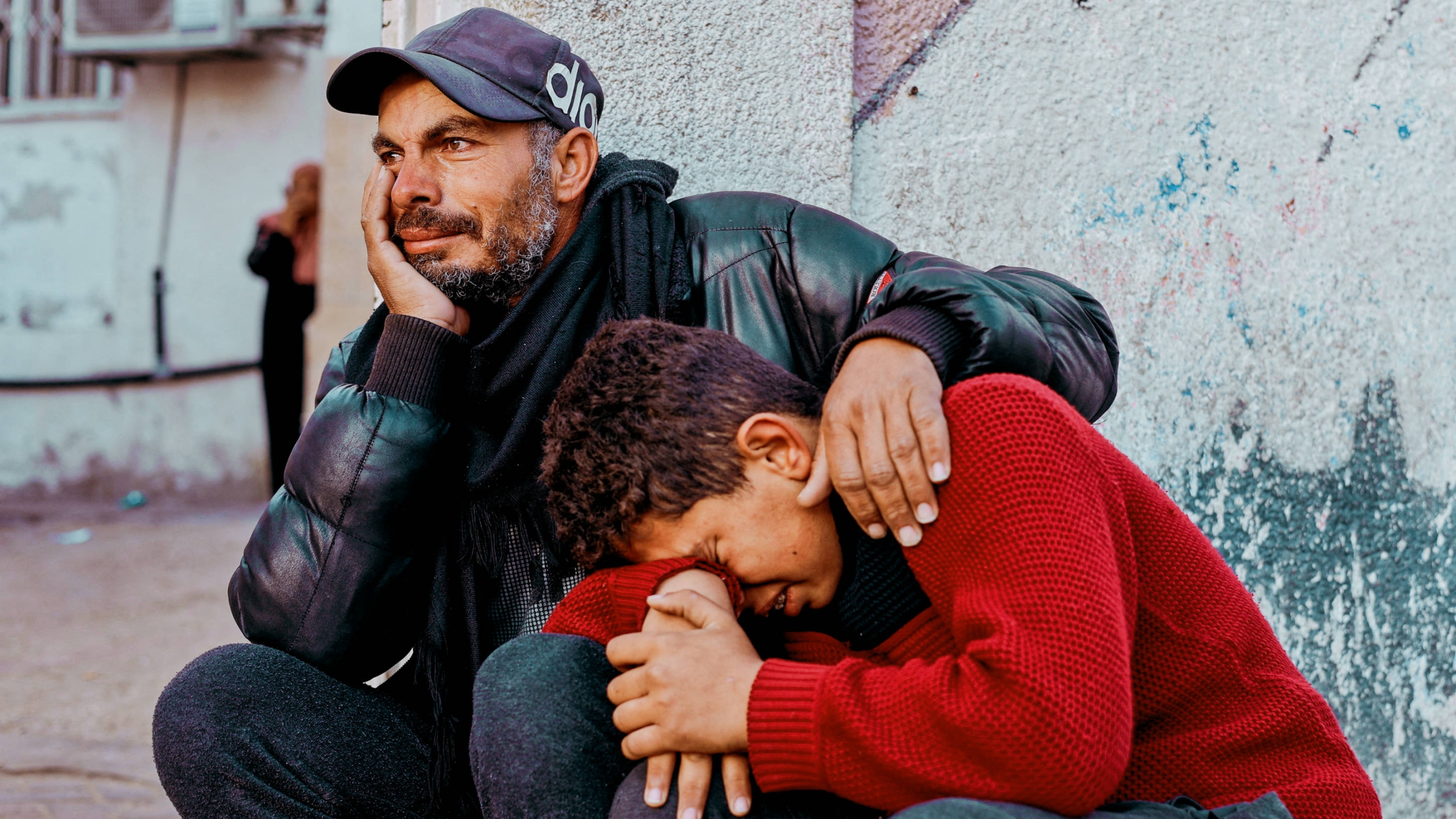
One of Gaza's last functioning medical facilities has been put completely out of service by Israel's ongoing raid, following a week-long siege and fuel shortages, the Palestinian health ministry said on Sunday.
"There are only four medical teams - 25 staff - currently caring for patients inside the facility," located in the southern city of Khan Younis, ministry spokesperson Ashraf al-Qudra told Reuters.
On Saturday, Israeli forces carried out several arrests within the hospital, where 10,000 people had been sheltering earlier in the week.
The army raided the hospital on Thursday, following a siege during which it forcibly removed hundreds of patients and displaced people sheltering in the building.
Israel says that the hospital is housing Hamas fighters, a claim it has regularly made when attacking hospitals in Gaza despite not having produced any credible evidence of a military presence inside them.
New MEE newsletter: Jerusalem Dispatch
Sign up to get the latest insights and analysis on Israel-Palestine, alongside Turkey Unpacked and other MEE newsletters
Most hospitals, including al-Shifa, the largest medical complex in Gaza, have been put out of action by Israel's offensive and lack of fuel, leaving a population of 2.3 million without proper healthcare.
Health officials said there was no power and not enough staff in Nasser Hospital to treat around 200 patients who remain there.
'The WHO team was not permitted to enter the hospital to assess the conditions of the patients and critical medical needs'
- Tedros Adhanom Ghebreyesus, WHO director
The hospital's generators have been out of action for three days, cutting the water supply, while sewage has flooded emergency rooms, making it impossible for the remaining staff to treat intensive care patients, Qudra said.
Lack of oxygen supplies, also a result of no power, has caused the deaths of at least seven patients, he said.
"Both yesterday and the day before, the WHO team was not permitted to enter the hospital to assess the conditions of the patients and critical medical needs, despite reaching the hospital compound to deliver fuel," the director-general of the World Health Organisation, Tedros Adhanom Ghebreyesus, said on X, formerly Twitter.
The Israeli military said its special forces were operating in and around the hospital, and have arrested at least 100 suspects on the premises.
Qudra accused Israeli forces of arresting 70 healthcare personnel and dozens of patients.
Talks not promising
Efforts to halt Israel's four-month-old offensive on the Gaza Strip have been expressly complicated by Israel's plans to launch a military operation in Gaza's southernmost city of Rafah, where around 1.5 million people have sought refuge.
Israel's relentless campaign has edged closer to the city, with attacks killing at least 10 people there and in central Gaza's Deir al-Balah overnight on Sunday, according to official Palestinian news agency Wafa.
At least 127 Palestinians were killed and 205 others wounded by Israeli attacks over the past 24 hours, bringing the death toll in Gaza since 7 October to 28,985, the Palestinian health ministry said.
Prospects for a ceasefire before the holy Muslim month of Ramadan further dimmed on Sunday, as mediator Qatar said that separate truce talks have hit an impasse.
Qatari Prime Minister Mohammed bin Abdulrahman Al-Thani told the Munich Security Conference that the talks were "not very promising".
Speaking at the same conference, Palestinian Authority Prime Minister Mohammad Shtayyeh said Russia has invited Palestinian factions to meet in Moscow on 26 February.
"We will see if Hamas is ready to come to the ground with us," Shtayyeh said.
"We are ready to engage. If Hamas is not then that's a different story. We need Palestinian unity," Shtayyeh said.
He added that to be part of that unity, Hamas would need to meet certain prerequisites.
Rafah offensive
The international community has recently ramped up its calls for a pause in the war, warning that a ground offensive on Rafah would create enormous human suffering.
However, even if a temporary truce deal is struck, Israeli Prime Minister Benjamin Netanyahu has vowed that the planned ground invasion of Rafah would go ahead.
Israeli Minister Benny Gantz said on Sunday that if Israeli captives held in Gaza are not returned by Ramadan, the military will expand its operations into Rafah.
Around 250 people were taken captive during a massive Hamas-led attack on southern Israel on 7 October. Around 130 are still held in Gaza, including 30 who are presumed dead.
Separately, Israel's cabinet unanimously voted on a measure that opposed what it called the "unilateral recognition" of Palestinian statehood.
"Israel rejects outright international dictates regarding a permanent accord with the Palestinians. An accord, should it be reached, will only come through direct negotiations between the sides, without preconditions," the formal Israeli statement said, according to the prime minister's office.
West Bank raid
Meanwhile in the occupied West Bank, two Palestinians were killed and three others wounded during an Israeli raid on Tulkarm refugee camp, according to Wafa.
An undercover Israeli unit raided the camp alongside military vehicles and a bulldozer in the morning.
Violent confrontations broke out, and Israeli forces killed Nabil Ata Amer, 19, and Mohammad Ahmad al-Oufi, 36.
The wounded Palestinians were taken to the nearby Thabet Governmental Hospital, after Israeli forces initially impeded ambulances from arriving in the refugee camp.
Israel has stepped up its near daily raids in the West Bank since the start of the war.
At least 398 Palestinians have been killed by Israeli forces or settlers in the West Bank since October 7, according to the Palestinian health ministry.
Middle East Eye delivers independent and unrivalled coverage and analysis of the Middle East, North Africa and beyond. To learn more about republishing this content and the associated fees, please fill out this form. More about MEE can be found here.


